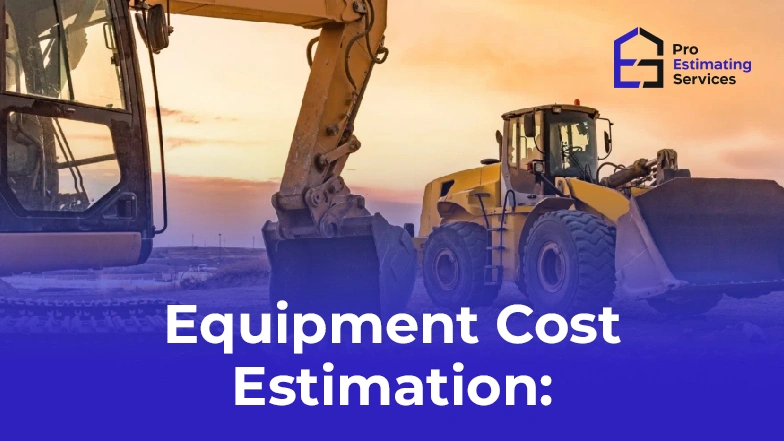
Budget Estimating

Freelance Estimating

Blueprint Estimating




Equipment cost estimation is the most critical part of construction planning. Whether you’re bidding on a big infrastructure project or managing costs for a small residential build, knowing how to estimate equipment cost can make or break your budget.
From fuel usage to depreciation, a well-structured equipment estimate helps you avoid surprises, improve your bidding, and get ahead of the competition and profitability. It also allows construction professionals to manage schedules, anticipate maintenance needs, and make smarter decisions about buying, leasing, or renting equipment. This level of control contributes to project efficiency and better long-term asset management.
Equipment cost estimation forecasts the cost of owning, leasing, operating, and maintaining construction equipment over a specific period or project lifecycle. These estimates are part of a project’s overall budget and are essential for cost control, job costing, and bid preparation. Estimators must factor in the acquisition costs and long-term financial implications of each piece of equipment, including resale value, insurance, and downtime.
It includes:
These costs contribute to the total equipment budget, which can impact profit margins if miscalculated. A thorough understanding of these components allows estimators to present data-backed proposals to clients and project stakeholders.
Inaccurate equipment estimates can blow up even the best-planned construction projects. Here’s why precision is important:
Many contractors who don’t estimate equipment costs correctly absorb unnecessary losses or have disputes with clients over budget variances. That’s why the estimation process is not optional—it’s mandatory.
Breaking down equipment costs helps avoid missing any hidden expenses. A thorough analysis of the following components gives a clearer financial picture:
Depending on the project, equipment, and historical data availability, different methods can be applied. Each method has its strengths, and combining them often gives the most accurate results:
Using modern tools helps to streamline the estimation process and increase accuracy. The following are commonly used in the construction industry:
Benefits of software tools:
Avoid these pitfalls to improve the accuracy of your estimates and protect profit margins:
To ensure reliable and consistent estimates, professionals should build a systematic approach. These best practices help create a framework:
Following these practices improves accuracy and builds client trust by showing professionalism and consistency.
Several things: equipment type, usage hours, fuel efficiency, project location, maintenance frequency, and even operator skill levels.
Incorrect estimates can either inflate the bid (making you less competitive) or underbid (causing you to lose profit or be unable to deliver).
Industry-standard tools like RSMeans, HeavyBid, and B2W Estimate have accurate databases and automation features that speed up the estimating process.
Yes. If the equipment is needed for a short duration or infrequent projects, renting can save on storage, insurance, and maintenance.
Resources:
Equipment cost estimation isn’t just about numbers, it’s about strategic planning that affects your bottom line. The more accurate your estimates, the better your bids, budget, and execution will be. Knowing every cost component, from depreciation to fuel, gives you better control over every dollar spent on site.
Accurate estimating services give contractors a competitive edge to increase profitability and reduce risk across all project phases.
I'm James, a professional cost estimator with extensive experience working across various sectors of the construction industry. Over the years, I've had the opportunity to collaborate with contractors, developers, and architects on projects of all sizes. I specialize in accurate budgeting, quantity takeoffs, and bid preparation that helps teams stay on track and competitive.
View all posts by James Harden